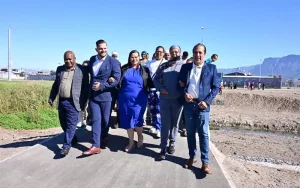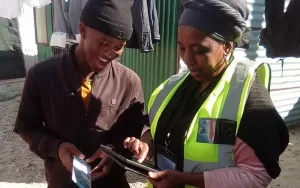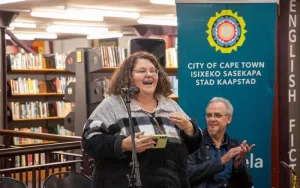South Africa’s Minister of Justice and Correctional Services, Ronald Lamola, has called for a renewed investigation into the deaths of three influential antiapartheid activists, Chief Albert Luthuli, Mr. Mlungisi Griffiths Mxenge, and Mr. Booi Mantyi. The circumstances of their deaths remain unclear, and new evidence has emerged to challenge the original investigations. Lamola believes that justice is not constrained by time and that the pursuit of truth is essential. The reexamination of these cases may reopen old wounds, but it is crucial for creating a future that is more transparent and truthful.
South Africa is about to experience a major transformation in its health care system with the signing of the National Health Insurance (NHI) Bill, which aims to provide universal health care coverage. However, the bill has faced opposition and controversy from stakeholders who question its viability, practicality, and potential impact on the economy. Despite this, the signing ceremony represents a significant shift in South Africa’s commitment to social justice and the future impact of the NHI Bill on the country’s health care system and its populace remains to be seen.
The South African building collapse that claimed 20 lives and left 32 people unaccounted for has drawn concerns from Police Minister Bheki Cele over the developers and contractors’ unwillingness to reveal crucial details about the workforce employed on the doomed project. While the landowning corporation, Neo Victoria Developments, has attempted to clarify its stance, the construction firm contracted for the project, Liatel Developments, has voiced the need to focus on rescue operations. As the investigation continues, questions remain about the cause of the tragedy and who is to be held accountable to prevent future disasters of this nature.
On Monday, May 13th, 2024, the Ad Hoc Committee on the General Intelligence Laws Amendment Bill met to consider public reactions to proposed changes, including responses from the State Security Agency (SSA) and legal guidance from the Parliamentary Legal Services. The exchange was an enlightening display of democracy at work, demonstrating the country’s dedication to transparency and active civic participation. The SSA’s constructive responses to public feedback and proactive engagement showcased their readiness to engage with the public, while the public’s participation exemplified an exemplary form of participatory governance.
The ’30 Years the Occupants’ exhibit at Cape Town’s HUB Gallery showcases the journey of South Africa through visual narratives. The exhibit is a collaboration between Matthew Willman’s ‘Mandela Heritage Collection’ and the Spier Collection, displaying intimate instances with Mandela and vividly portraying the nation’s democratic metamorphosis since 1994. The exhibition is open to the public until 31st May 2024, offering an opportunity to engage with the cultural narratives, question, and reminisce.
The City of Cape Town has invested over R5.5m in the Maitland Sewer Pipe Replacement Project, which aims to replace outdated sewer pipes in the Maitland district. The project uses an innovative approach called Curedinplace pipe (CIPP) to line old vitrified clay sewer pipes with a resincoated textile tube, resulting in a jointless and flawless lining. The project serves as an example for other cities on how to prioritize and tackle infrastructurerelated issues, while emphasizing civic responsibility and the importance of collaboration and compliance among citizens.
The South African parliament’s agenda for May 1315, 2024, includes a range of legislation, committee meetings, and touching farewell speeches from esteemed members. The week’s discussions will revolve around critical bills such as the Basic Education Laws Amendment Bill, National Water Resources Infrastructure Bill, and Railway Safety Bill. The week concludes with members’ farewell speeches, representing their personal and political trajectories in parliament. The schedule reflects the vibrant and dynamic nature of South Africa’s political structure, shaping the future of the nation.
Honourable Yvonne Mokgoro was a groundbreaking black woman judge in South Africa’s judicial system, known for her strong advocacy for women’s rights. Her relentless pursuit of knowledge and unwavering commitment led her to make history. Her legacy lives on, inspiring others to strive towards creating a more equitable society. Her passing is mourned, but her lasting impact on South Africa’s judicial system remains.
The unveiling of the Vygekraal pedestrian bridge in Cape Town represents progress, community integration, and safety. The bridge, which connects Kewtown and Bridgetown, provides easy access to schools, colleges, and places of worship. The completion of the bridge was not without its challenges, but it stands as a testament to the collective efforts of residents, officials, and community leaders. The bridge is designed to serve the public, and its purpose is to unify dreams, aspirations, and the shared destiny of its people.
Participate in the City Initiative: Leverage the Household Survey to Influence Your Neighbourhood
The City of Cape Town is conducting a household survey to gain insight into the socioeconomic circumstances of different communities, with over half of the targeted 10,000 interviews already completed. Residents can participate to help shape their communities’ future and enhance service delivery. The collected data is confidential and adheres to the Protection of Personal Information Act, and participation is voluntary. Kantar, a data collection agency, is conducting the survey with safety measures in place to ensure legitimacy and minimize privacy intrusion.
The deliberate removal of manhole covers and the addition of foreign objects leads to severe blockages and overflows, posing a dangerous threat to public health and safety. The community must take responsibility and practice responsible waste disposal to protect the vital infrastructure that maintains the city’s health and cleanliness. The city has initiated awareness campaigns and a hotline to report incidents, but residents must also play a significant role in protecting their city’s health.
The City of Cape Town’s Central Library has launched the Oral History Project, which preserves the stories of local musicians. This innovative project transforms library services into a platform for preserving and educating about music history. Video podcasts are available to the public on YouTube and linked to the Online Public Access Catalog, allowing everyone to experience the vibrant cultural history of Cape Town’s music community.
Cape Town is upgrading its aging water and sanitation infrastructure due to population growth and deteriorating pipes, with the Water and Sanitation Directorate aiming to replace 50,000 meters of water pipes by 2023/2024. The city has already replaced over 40,315 meters by March 2024, with dedicated teams working on projects across various locations to achieve significant progress towards their goal. This infrastructure overhaul is a story of resilience and determination, securing Cape Town’s sustainable future.
Prince Harry has returned to the UK to commemorate the 10th anniversary of the Invictus Games, an event he founded in 2014 to celebrate wounded, injured, and ailing servicemen and women. His visit is filled with duty, loyalty, and his decadelong allegiance to the cause. Despite his father’s battle with cancer, Prince Harry’s commitment to his royal duties and the Invictus Games remains unwavering. Although a reunion with his father may not be possible during this trip, the royal family’s resilience and dedication to their respective causes remain steadfast.
South Africa is showing its strength and resilience in the face of the devastating collapse of a building in George. President Cyril Ramaphosa has expressed his condolences, and emergency personnel and volunteers are working tirelessly together in ongoing rescue efforts. The unity and compassion displayed in the face of tragedy are a testament to the human spirit’s capacity to withstand adversity. Despite the mounting death toll, the ongoing operation is a beacon of hope and solidarity for the nation.
Facing Nuclear Threats: Cape Town’s Fire and Rescue Hazmat Team Responds with Expertise and Courage
Cape Town’s Fire and Rescue Hazmat Team responded to a distress call regarding a container of radioactive material found at a scrapyard. With their expertise and stateoftheart technology, they followed strict procedures to evaluate the risk and remove the waste safely. Their professionalism was crucial in handling this potentially catastrophic nuclear incident, highlighting their commitment to public safety and making them the city’s protectors.
















